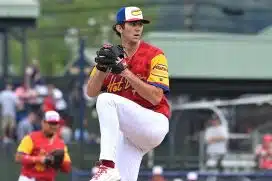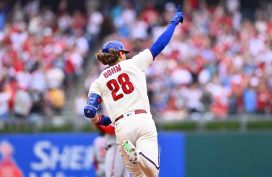By Matt Rappa, Sports Talk Philly editor
Mobile sports betting has already been legalized in New Jersey, Nevada and West Virginia — allowing fans of two NFL franchises, two NHL teams, one MLS club, and one WNBA organization to bet on live game action from their seats, inside the respective venues.
Now, with the Pennsylvania Gaming Control Board expecting the state’s first online sportsbook to begin live testing before June, the Philadelphia Phillies and Pittsburgh Pirates will be the first MLB organizations to host fans legally betting on mobile devices, according to SportTechie's Joe Lemire.
Lemire notes that the impact of this new, in-game fan entertainment option "may be more symbolic than anything." MLB has shifted its previously longstanding, traditional view on gambling — contradicting their stance on the 1919 Black Sox and Pete Rose scandals. In 2012, then-commissioner Bud Selig called gambling “evil," and that it "creates doubt and destroys your sport.” Just a year later, however, MLB partnered with daily fantasy sports operator DraftKings; last November, the league established an official gaming partnership with MGM Resorts.
At SportTechie's State Of The Industry conference in February, now-commissioner Rob Manfred discussed MLB's betting policies "regulating commercial activities and insuring the integrity of games," writes Lemire.
"Mobile is a reality. It is going to be the predominant vehicle by which people engage in sports betting. It’s kind of like analytics, you have to accept that reality," Manfred said. "Then I think what you try to do is build in limitations around what the clubs can do so that mobile activity that is going to go on in the stadium doesn’t become all-pervasive. We’re a family entertainment product."
Lemire later noted that sports betting has occurred for years, if not decades through illegal offshore sportsbooks, meaning in-venue betting is not a "truly novel experience." Eilers & Krejcik Gaming's Chris Grove told Lemire that the true novelty or change will be when "teams and leagues begin integrating betting into the fan experience through sponsorships, promotions, venue installations, and prize-based betting. Until then, professional sports will continue to be adjacent to betting rather than actually involved.”
While the Phillies, Pirates, nor the rest of MLB have yet to announce such plans, the league's EVP for gaming and new business ventures, Kenny Gersh, recently told SportTechie that it is developing predictive, free-to-play contests — casual, engaging games where fans can earn prizes without actually betting.
“We are actually working internally to create some free-to-play games,” Gersh said. “We’re not ready to totally publicly announce that we’re launching something, but probably next year at the latest. … Part of that for me, too, is helping drive the betting industry to make more engaging games. Right now, the way betting on baseball has been traditionally done has a fairly high learning curve for a casual fan to figure out how they would bet on baseball.”
MLB may never install betting kiosks inside stadiums; overseas officials, according to Manfred, told its league executives that “maybe there’s too much sports betting surrounding their sport" in Europe. Manfred said MLB will recognize that the mobile is occurring, but will "build in rules around it."
“And in some ways, mobile helps you, right? If you have mobile betting available, it reduces the pressure you might otherwise get to have kiosks or betting parlors or whatever. If somebody’s doing it on their phone, you don’t know if they’re looking at their Facebook page or making a bet, and that may be a good thing.”
The league's current primary focus is assuring in-stadium bettors do not have advance knowledge of betting outcomes, subject to external delays due to data transmission lagging . To prevent unofficial transmission of game statistics, MLB is making sure every ballpark has a "dedicated fiber optic connection"; Gersh also hopes MLB licenses its official data feed.
“My concern is making sure that someone in the ballpark—because of the delay of information getting outside the ballpark—doesn’t have an unfair advantage or isn’t somehow gaming the system. That’s where I think the official data becomes really important. It isn’t that it’s ‘official’ versus ‘unofficial,’ it’s that our fast and reliable. We’re going to be able to tell people outside the ballpark what’s happening inside the ballpark.”
After this weekend's series, the Phillies will not play again at home until May 28-30. The Pirates, meanwhile, will be home May 21-26 and May 30-31 — meaning, depending on the date, either Citizens Bank Park or PNC Park could be the actual first venue to host fans legally betting.







